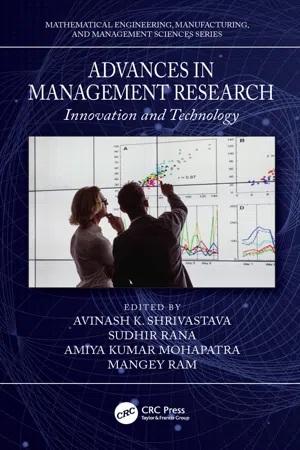
Advances in Management Research
Innovation and Technology
- 292 pages
- English
- ePUB (mobile friendly)
- Available on iOS & Android
Advances in Management Research
Innovation and Technology
About This Book
This book covers advancements across business domains in knowledge and information management. It presents research trends in the fields of management, innovation, and technology, and is composed of research papers that show applications of IT, analytics, and business operations in industry and in educational institutions.
It offers a combination of scientific research methods and concepts, with contributions from globally renowned authors; presents various management domains from a number of countries for a global perspective; and provides a unique combination of topics and methods while giving insights on the management domain using a holistic approach.
The book provides scholars with a platform to derive maximum utility in the area of management, research, and technology by subscribing to the idea of managing business through performance and management technology.
Frequently asked questions
1 Impact of Credit Access on Economic Empowerment of Married Women in Ethiopia
Contents
- 1.1 Overview
- 1.1.1 Background
- 1.1.2 Problem Statement
- 1.1.3 Objectives of the Study
- 1.1.4 Scope and Limitation of the Study
- 1.1.5 Significance of the Study
- 1.1.6 Organization of the Chapter
- 1.2 Literature Review
- 1.2.1 Microfinance and Women’s Empowerment Globally
- 1.2.2 Microfinance and WEE in Africa
- 1.2.3 Microfinance and WEE in Ethiopia
- 1.3 Methodology, Data, and Model
- 1.3.1 Description of the Study Area
- 1.3.2 Background of ACSI
- 1.3.3 West Gojjam Zone
- 1.3.4 Jabi Tehinan Woreda/District
- 1.3.4.1 Sampling Techniques and Sample Size
- 1.3.5 Method of Data Analysis
- 1.3.5.1 Descriptive and Inferential Statistics
- 1.3.5.2 Econometric Model
- 1.3.5.3 Propensity Score Matching (PSM)
- 1.3.5.4 Description of Variables
- 1.4 Results and Discussion
- 1.4.1 Econometric Analysis
- 1.4.2 Factors Affecting Married Women’s Decision-Making
- 1.5 Conclusion and Suggestions
- 1.5.1 Conclusion
- 1.5.2 Recommendation
- References
1.1 Overview
1.1.1 Background
1.1.2 Problem Statement
1.1.3 Objectives of the Study
- To estimate the impact of credit access on the saving of married women
- To estimate the impact of credit access on increasing the income of married women
- To identify determinants of married women’s participation in the decision-making process
1.1.4 Scope and Limitation of the Study
1.1.5 Significance of the Study
1.1.6 Organization of the Chapter
Table of contents
- Cover
- Half Title
- Series
- Title
- Copyright
- Contents
- Preface
- Editor Biographies
- 1 Impact of Credit Access on Economic Empowerment of Married Women in Ethiopia
- 2 Relationship between Work–Life Balance and Job Satisfaction of Reception and Concierge Employees in Five-Star Hotels in Colombo
- 3 The Evolution of Digital Platforms
- 4 Impact of Exchange Rate Movements and World Output on Indian Exports
- 5 Information and Communication Technology as a Contingent Factor in India’s Economic Growth–Remittances Nexus
- 6 Effects of Capital Adequacy on Operational Efficiency of Banks: Evidence from Bangladesh
- 7 Time and Frequency Analysis Using the ARMA Model: Evidence from the Indian Stock Market
- 8 Behavioural Biases and Trading Volume: Empirical Evidence from the Indian Stock Market
- 9 Leveraging Tacit Knowledge for Strategizing: Impact on Long-Term Performance
- 10 Analysis of Investors’ Perceptions of Mutual Fund Investment in the Context of the Delhi/NCR Region
- 11 Measuring Customer Brand Equity and Loyalty: A Study of Fuel Retail Outlets in Lucknow
- 12 Random Walk Hypothesis: Evidence from the Top 10 Stock Exchanges Using the Variance Ratio Test
- 13 Priority-Based Time Minimization Transportation Problem with Flow and Mixed Constraints
- 14 ASEAN and India: Exploring the Progress and Prospects in Trade Relationship
- 15 Impact of Internationalization on Financial Performance: A Study of Family and Non-Family Firms
- 16 The Role of a Responsible Global Citizen (Gitizen) in the 21st Century
- 17 Small and Medium-Sized Enterprise Networks and Their Contribution to Territorial Development
- 18 Influence of Branding of Financial Instruments on Investment Decisions: Mediating Role of Behavioral Biases
- 19 Proposed Model of Evaluating Entrepreneurial University Ecosystems from a Talent Development Perspective
- 20 Research and Innovation in Teaching Pedagogy for Emerging Markets
- Index